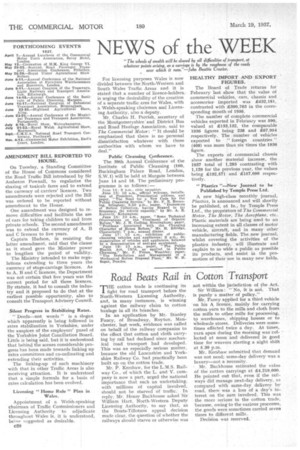Road Beats Rail in Cotton Transport
Page 70

If you've noticed an error in this article please click here to report it so we can fix it.
E cotton trade is continuing its fight for road transport before the North-Western Licensing Authority, and, in many instances, is winning against the railway claim to cotton haulage in all its branches, In an application by Mr. Stanley Fancy, of Broadway, Royton, Manchester, last week, evidence was called on behalf of the railway companies to the effect that cotton and cloth carrying by rail had declined since mechanical road transport had developed. This was an especially serious matter, because the old Lancashire and Yorkshire Railway Co. had practically been built up on the cotton trade.
Mr. P. Kershaw, for the L.M.S. Railway Co., of which the L. and Y. company is now a part, urged the national importance that such an undertaking, with millions of capital involved, should not be starved of traffic. In reply, Mr. Henry Backhouse asked Sir William Hart, North-Western Deputy Licensing Authority, to say that, as the Bouts-Tillotson appeal decision made clear, the question of whether the railways should starve or otherwise was not within the jurisdiction of the Act. Sir William: "No, it is not. That is purely a matter of policy."
Mr. Fancy applied for a third vehicle on his A licence, mainly for carrying cotton yarn to the mills and cloth from the mills to other mills for processing. to warehouses, shipping houses or to Wholesale stores. Deliveries were sometimes effected twice a day. At times, yarn spun during the morning was collected at noon and delivered in good time for weavers starting a night shift at 5.30 p.m.
Mr. Kershaw submitted that demand was not need; same-day delivery was a luxury—not a necessity.
Mr. Backhouse estimated the value Of the cotton carryings at £4,219,000. He pointed out that, even if the railways did manage next-day delivery, as compared with same-day delivery by road, there was a loss of a day's interest on the sum involved. This was the more serious in the cotton trade, because, owing to the various processes, the goods were sometimes carried seven times to different mills.
Decision was reserved.
























































































































































